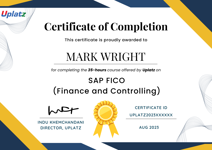
Data Science Manager Career Path
Self-paced videos, Lifetime access, Study material, Certification prep, Technical support, Course Completion Certificate
Uplatz
Summary
- Uplatz Certificate of Completion - Free
Add to basket or enquire
Overview
Uplatz provides this powerful and extensive Career Path program to help you become a Data Science Manager. It is a program covering all topics related to management of Data Science & Machine Learning projects in the form of self-paced video tutorials. You will be awarded Course Completion Certificate at the end of the course.
A data science manager is a professional who oversees the work of data scientists and ensures that they are effectively utilizing their skills to drive business value. They play a crucial role in bridging the gap between data and business strategy, helping organizations make informed decisions based on data-driven insights.
Courses included in this Data Science Manager career path programme are:
- Python Programming
- Python Programming (basic to advanced)
- R Programming
- R Programming (basic to advanced)
- SQL Programming
- Data Science with Python
- Data Science with R
- Data Visualization with Python
- Data Visualization with R
- Business Intelligence and Data Analytics
- Machine Learning with Python
- Machine Learning (basic to advanced)
- Deep Learning Foundation
- Introduction to Cloud Computing
Core Roles and Responsibilities of a Data Science Manager:
Strategic Leadership: Data science managers provide strategic direction for data science initiatives, aligning them with the overall business objectives. They guide the team in identifying data-driven opportunities that can improve business processes, enhance customer experiences, and optimize operations.
Team Management and Mentorship: Data science managers lead and manage a team of data scientists, providing them with guidance, mentorship, and career development opportunities. They foster a collaborative environment where data scientists can share knowledge, exchange ideas, and learn from each other.
Project Management and Execution: Data science managers oversee the planning, execution, and delivery of data science projects. They break down complex projects into manageable tasks, ensuring that deadlines are met and resources are allocated effectively.
Data Quality and Governance: Data science managers implement data quality processes and governance frameworks to ensure the accuracy, completeness, and reliability of data. They establish data standards, monitor data pipelines, and address data quality issues promptly.
Communication and Stakeholder Management: Data science managers communicate effectively with stakeholders at all levels of the organization, translating technical findings into actionable insights that can be understood and utilized by business leaders. They manage expectations, address concerns, and promote data literacy across the organization.
Technical Expertise and Domain Knowledge: Data science managers possess strong technical expertise in data science methodologies, programming languages, and statistical modeling techniques. They also have a deep understanding of the organization's industry, business processes, and customer needs.
Collaboration and Cross-Functional Partnerships: Data science managers collaborate with other departments, such as product development, marketing, and customer service, to ensure that data insights are integrated into decision-making across the organization.
Continuous Learning and Innovation: Data science managers stay up-to-date with the latest advancements in data science techniques, tools, and technologies. They encourage their team to continuously learn and innovate, adapting to the evolving data landscape.
Certificates
Uplatz Certificate of Completion
Digital certificate - Included
Course Completion Certificate by Uplatz
Course media
Description
Skills and Qualifications for Data Science Managers
- Strong technical skills: proficiency in programming languages like Python or R, data analysis tools, and machine learning algorithms.
- Leadership and management skills: ability to lead, motivate, and develop a team of data scientists.
- Communication and collaboration skills: ability to communicate effectively with stakeholders from diverse backgrounds.
- Problem-solving and analytical skills: ability to identify and solve complex problems using data-driven insights.
- Business acumen: understanding of business processes, industry trends, and customer needs.
- Adaptability and innovation: ability to adapt to the evolving data landscape and embrace new technologies.
Career Path
The career path for a data science manager can be diverse and rewarding, offering continuous learning and advancement opportunities. Here's a typical progression:
1. Data Scientist / Analyst: Gaining hands-on experience with data analysis, modeling, and communication.
2. Senior Data Scientist / Lead: Leading smaller projects, mentoring junior team members, and contributing to strategic planning.
3. Data Science Manager: Leading a team of data scientists, managing projects, and collaborating with stakeholders.
4. Director of Data Science / Chief Data Officer: Overseeing the entire data science function, setting strategy, and managing budgets.
Alternative paths
- Technical Specialist: Deepen expertise in specific areas like machine learning or NLP (Natural Language Processing) and become a technical lead or consultant.
- Entrepreneur: Leverage experience to found a data science startup or consulting firm.
- Academia: Contribute to research and teaching in data science.
Job Prospects
The job prospects for data science managers are excellent and expected to remain strong in the foreseeable future. The demand for data-driven insights across various industries is increasing exponentially, leading to a shortage of qualified data science professionals. Managers, who bridge the gap between technical expertise and business needs, are particularly sought-after.
Here are some key factors driving strong job prospects:
- Growing reliance on data: Organizations are increasingly dependent on data-driven decision-making, creating a higher demand for managers who can effectively utilize data science expertise.
- Skill shortage: The supply of qualified data science managers is currently lagging behind the demand, pushing salaries and career progression opportunities upwards.
- Versatility: Data science managers can adapt to diverse industries, creating broader career options and increased job security.
Challenges:
- Competition: While promising, the field is getting increasingly competitive, requiring continuous learning and skill development to stay ahead of the curve.
- Dynamic landscape: The field of data science is constantly evolving, so managers need to adapt their skills and knowledge to stay relevant.
The career path of a data science manager is full of potential and offers exciting opportunities for advancement and a high-demand skillset. However, staying adaptable and continuously learning are key to thriving in this dynamic and competitive field.
Who is this course for?
Everyone
Requirements
Passion and Determination to achieve your goals!!!
Career path
- Data Science Manager
- Data Scientist
- Senior Data Scientist
- Machine Learning Engineer
- Data Analyst
- Python with Data Science - Trainer
- Lead Data Scientist
- Software Engineer (Data Scientist)
- Data Scientist - Machine Learning
- Principal Data Scientist
- Associate Data Scientist
- People Data Scientist
- Business Analysts - Data Scientist
- Deep Learning Engineer
- Data Consultant
- Data Science Developer
Questions and answers
Currently there are no Q&As for this course. Be the first to ask a question.
Reviews
Currently there are no reviews for this course. Be the first to leave a review.
Legal information
This course is advertised on reed.co.uk by the Course Provider, whose terms and conditions apply. Purchases are made directly from the Course Provider, and as such, content and materials are supplied by the Course Provider directly. Reed is acting as agent and not reseller in relation to this course. Reed's only responsibility is to facilitate your payment for the course. It is your responsibility to review and agree to the Course Provider's terms and conditions and satisfy yourself as to the suitability of the course you intend to purchase. Reed will not have any responsibility for the content of the course and/or associated materials.



